

Inside the adult ADHD brain. How ADHD Affects Your Brain. AttentionTalkVideo. Attention Talk Video hosted by ADHD & Attention Coach Jeff Copper Attention Talk Video which is part of the Attention Talk Network which includes Attention Talk Radio and Attention Talk News!

Attention Talk Video ( is a part of the Attention Talk Network, which includes Attention Talk Radio... Your ADHD Information Station! ( Attention Talk News... Your ADHD News Source! Fix your Time Management (how I deal with ADD) ADHD and Working Memory (English) ADHD: Brain Dump Versus Task List. ADHD Inattentive Type and Chronic Depression. Peter Doolittle: How your "working memory" makes sense of the world. I hate ADHD so fucking much. I can't read a fucking book no matter what I do. I'm not eating and I have mood swings from my pills. ADHD is the worst thing to happen to my life. (Rant) : ADHD. Keys 2 Cognition - Cognitive Processes. 47.
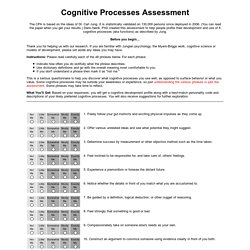
Trust what emerges from brainstorming. 48. Easily get in sync physically with people and things around you. To help us improve this assessment, please answer the following questions: Everyday Tips for the Bored and Impatient - ADD/ADHD Center. Test on Which Type Might You have. How to Rebuild Your Attention Span and Focus. ADDA - Attention Deficit Disorder Association. When we are bored, it can be difficult to muster up the energy and motivation to get anything accomplished.
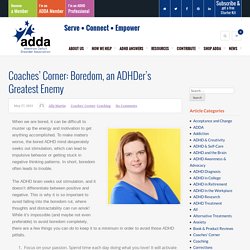
To make matters worse, the bored ADHD mind desperately seeks out stimulation, which can lead to impulsive behavior or getting stuck in negative thinking patterns. In short, boredom often leads to trouble. The ADHD brain seeks out stimulation, and it doesn’t differentiate between positive and negative. This is why it is so important to avoid falling into the boredom rut, where thoughts and distractability can run amok!
While it’s impossible (and maybe not even preferable) to avoid boredom completely, there are a few things you can do to keep it to a minimum in order to avoid those ADHD pitfalls. Beat Boredom with ADHD: Stay Motivated, Energized, and On-Task. Boredom stresses people with ADHD more than those who haven't been diagnosed with the condition.
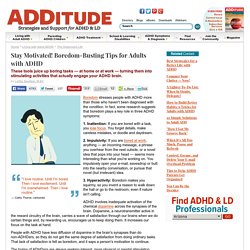
In fact, some research suggests that boredom plays a key role in three ADHD symptoms: 1. Inattention: If you are bored with a task, you lose focus. You forget details, make careless mistakes, or doodle and daydream. 2. Help ADD and ADHD with Beta Binaural Beats - Brain Entrainment to Fix ADD and ADHD. Trouble With Transitions For ADHD Adults. How To Manage Them. Many adults with ADHD have trouble with transitions.
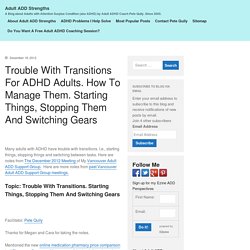
I.e., starting things, stopping things and switching between tasks. Here are notes from The December 2012 Meeting of My Vancouver Adult ADD Support Group. 8 Things Everybody Ought to Know About Concentrating. “Music helps me concentrate,” Mike said to me glancing briefly over his shoulder.

Mike was in his room writing a paper for his U.S. History class. On his desk next to his computer sat crunched Red Bulls, empty Gatorade bottles, some extra pocket change and scattered pieces of paper. In the pocket of his sweat pants rested a blaring iPod with a chord that dangled near the floor, almost touching against his Adidas sandals. On his computer sat even more stray objects than his surrounding environment. Mike made a shift about every thirty seconds between all of the above.
Do you know a person like this? The Science Behind Concentration In the above account, Mike’s obviously stuck in a routine that many of us may have found ourselves in, yet in the moment we feel it’s almost an impossible routine to get out of. When we constantly multitask to get things done, we’re not multitasking, we’re rapidly shifting our attention. Adult ADD Blog: Dating, Love, Relationship, Career, & Work Advice. Control ADHD & Focus - Subliminal Message Session - By Thomas Hall.
Mental Workout For Increased Focus, Attention and Emotional Stability - Isochronic Tones. Attention Sappers Reasons You Can't Concentrate. You misplace your keys, waver between work assignments and YouTube, and daydream during conversations.

Beating Procrastination - Time Management Skills from MindTools.com. It's Friday afternoon and the clock is ticking.

You're working furiously to complete a task before the five o'clock deadline, while silently cursing yourself for not starting it sooner. How did this happen? What went wrong? ADHD and Adults: Helpful Tips for Beating Boredom. Because the ADHD brain thrives on interesting, challenging and novel tasks, it’s really hard for people with ADHD to complete anything that bores them.
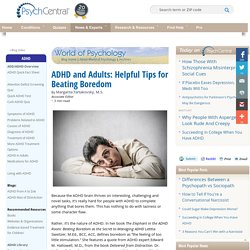
This has nothing to do with laziness or some character flaw. Rather, it’s the nature of ADHD. In her book The Elephant in the ADHD Room: Beating Boredom as the Secret to Managing ADHD Letitia Sweitzer, M.Ed., BCC, ACC, defines boredom as “the feeling of too little stimulation.” Essential Oils For ADHD, Focus, and Concentration. Are you or your children struggling to focus and concentrate on the tasks at hand?

School, work, home life – we know, they all require attention. Whether it’s ADHD or that occasional brain fatigue, organic remedies like essential oils can work natural wonders. Is this Adult ADD? Can't focus on homework... You just described what i go through perfectly: - in the middle of starting to study, go Google "shame-based personality" etc. for the billionth time. see the same pages every time. still can't read them just like i can't read anything else. - entire weekend filled with anxiety passes-- with me putting everything else on hold, feeling anxious about what i should be doing, only to burn the midnight oil at the last minute. For all you ADHDer's Predominantly Inattentive Type.
Drug free treatment of Attention Deficit Disorder (ADD, ADHD), Mild to Moderate Autism Spectrum Disorders, Sleep Disorders, Chronic Depression, Chronic Anxietym, and Peak Performance Training. ADHD Predominantly Inattentive Type (WWK8) ADHD Predominantly Inattentive Type (WWK8) Can't find what you're looking for? Our health information specialists are here to help. Contact us at 800-233-4050 or online. WWK refers to the What We Know series of information sheets on ADHD. See the complete list. For more than 100 years, extremely hyperactive children have been recognized as having behavioral problems. Having trouble making a decision? Chances are you’re being too rational. Here’s why you’re stuck – you’re only accessing half your brain. Here is a little known fact: being a good rational thinker is not the same thing as being good decision maker. The discovery of this simple fact sparked a major rethink of contemporary neuroscience, and understanding its impact should spark a major rethink of your approach to your career change.
You see, old school wisdom (from Plato up until not so long ago) suggested that rational thinking is the way to good decisions and that emotions are pesky things that get in the way of your sensible and logical decisions. A Splintered Mind: ADHD: Bored of Boredom - Five Ways to Bear It. One Way to Beat It. - Douglas Cootey. Last week's column didn't strike a chord in as many people as others I've written. I can only think that is a good thing. There is hope for the survival of the species. We can't all live like maniacs at the far edge, dangling off cliffs, betting the house on a football game, juggling machetes, etc...but would you be surprised to learn that all that high stimulation activity is a subset of something you probably CAN relate to?
Attention restoration theory. Attention Restoration Theory (ART) asserts that people can concentrate better after spending time in nature, or even looking at scenes of nature. Natural environments abound with "soft fascinations" which a person can reflect upon in "effortless attention", such as clouds moving across the sky, leaves rustling in a breeze or water bubbling over rocks in a stream. The theory was developed by Rachel and Stephen Kaplan in the 1980s in their book The experience of nature: A psychological perspective,[1][2][3] and has since been found by others to hold true in medical outcomes as well as intellectual task attention, as described below.
Berman et al. discuss the foundation of the Attention Restoration Theory (ART).